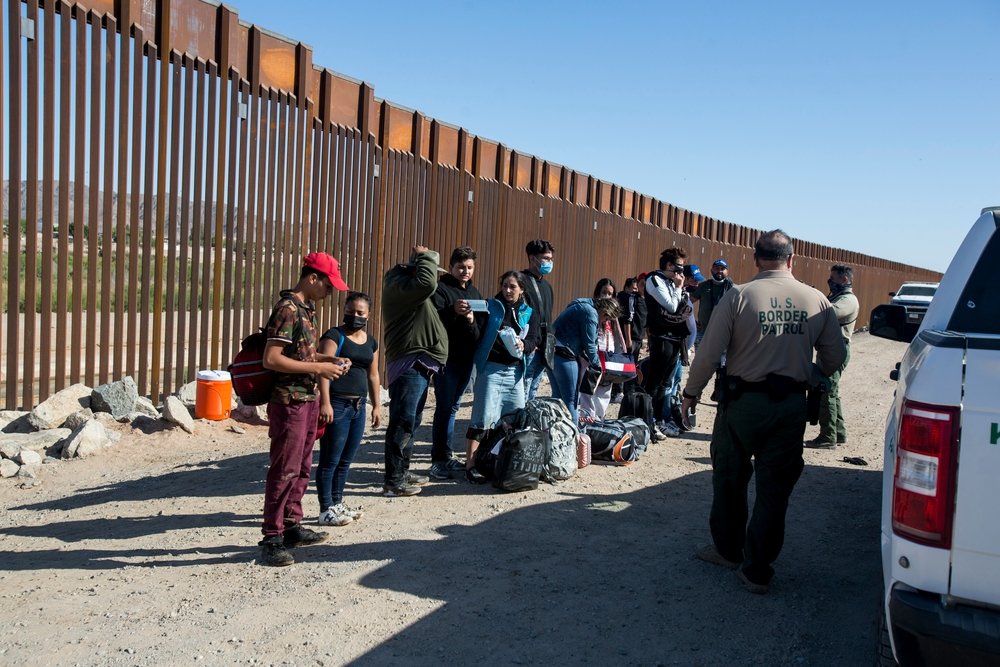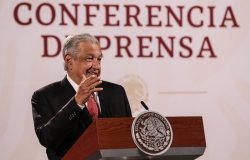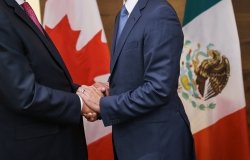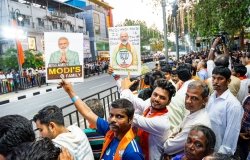Which Way Morena Youth?

Ringo Chiu /Shutterstock.com
Will the Mexican left finally put a stop to the slaughter of migrants on their behalf?
Soon the party leader will be dead. Andrés Manuel López Obrador, fondly known as AMLO by his supporters, is an old man. This summer, he will finish his historic six-year presidency and, at least formally, make his exit from Mexican political life. There is no other president who has done more for the average Mexican in living memory. Founder of the Morena party, which swept to national victory in 2018 despite being only four years old, AMLO has overseen a litany of policies that “put the poor first,” the golden rule of the president’s campaign. Under his tenure, the Mexican poverty rate has dropped to historic lows, the minimum wage has over doubled, and a number of new labor laws have been passed to empower trade unions. It is, without exaggeration, one of the greatest accomplishments of any Latin American political party in the last half-century.
But there is one glaring problem. What the average Mexican citizen has gained also came at the expense of the approximately 400,000 migrants who cross into the country each year. In 2014, Barrack Obama struck a discreet border externalization pact with then-right-wing President Enrique Peña Nieto known as the Southern Border Program. Under the Program, Mexico is paid millions of dollars each year to detain and deport as many migrants as possible before they can reach the US and ask for asylum. The militarization of Mexico’s immigration enforcement was swift and brutal. Approximately 20,000 migrant kidnappings occur in Mexico every year, and around 100,000 have simply been “disappeared,” meaning that they are likely dead but their remains have not been recovered. Apparently, to AMLO at least, these migrants did not count as part of the poor he promised to put first.
When Donald Trump was elected the stakes became even higher. He threatened to impose new tariffs on Mexico if they did not halt all undocumented migration to the US border. The deal was clear: keep migrants out of the US at all costs, and Mexico will be rewarded with a fat check. But dare to let migrants through, and the United States would intentionally tank Mexico’s economy, undoing all of Morena’s anti-poverty reforms.
In response, AMLO doubled down on border militarization, even inventing a new branch of the military, the National Guard, whose driving purpose seems to be beating migrant caravans on television. Many in Morena are quietly dismayed by this—how could a party that describes itself as anti-US intervention conduct, with relish no less, some of the gringos’ bloodiest bidding?—but few have dared to speak publicly against their own party leader.
But now change is on the horizon. This summer, Claudia Sheinbaum, AMLO’s named successor, is poised to become Mexico’s first female president. Sheinbaum, in actuality, is not significantly younger than AMLO. But in spirit she represents a new and fresh face for the party. Whereas AMLO’s vision for Mexico has always been firmly—one might even say petulantly—nationalistic, Sheinbaum’s outlook is more international. A formal doctoral researcher at UC Berkeley, as mayor of Mexico City Sheinbaum technocratically stewarded the metropolis in its reemergence as one of the world’s great cities, all the while attending—at least in part—to the growing number of poor, undocumented migrants within its urban boundaries. As mayor, Sheinbaum greenlit the refurbishment of three large migrant shelters, and has affirmed that Mexico City remains at the forefront of guaranteeing migrant rights in the country. It is enough to be cautiously optimistic.
But Claudia, too, has at times given the party mixed signals. She famously tweeted her support of Mexico City’s rapidly militarizing police forces, despite many reports that the police contribute to the city’s organized crime and extort migrants. There are also concerns that AMLO’s cult of personality will not simply fade in retirement, but that he will quietly exert his influence from the shadows, strongarming Sheinbaum into further militarizing the country, especially its immigration system.
This is a crucial moment for Morena, a party that surged to power largely with the backing of the country’s youthful left and working-class coalitions. Now that AMLO is on the way out, will Morena youth hold the party—and especially Sheinbaum—to its internationalist commitments to “put the poor first,” regardless of their nationality? Or will Morena betray its commitments and continue to sacrifice hundreds of thousands fleeing state violence and governmental collapse at the behest of the United States?
The best thing for Morena—and for AMLO’s legacy—is if its youth firmly demand their great leader die in peaceful obscurity. It is their party now, not his. May they use it for what it was intended for: empowering the world’s most vulnerable and exploited, Mexican and migrant alike.
About the Author


Mexico Institute
The Mexico Institute seeks to improve understanding, communication, and cooperation between Mexico and the United States by promoting original research, encouraging public discussion, and proposing policy options for enhancing the bilateral relationship. A binational Advisory Board, chaired by Luis Téllez and Earl Anthony Wayne, oversees the work of the Mexico Institute. Read more










